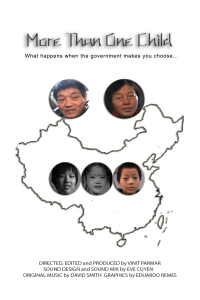 See the trailer
See the trailer
LOGLINE
The parents sacrificed for a son. The price was their daughters. Two sisters, hidden for years to escape China’s One Child Policy, return home to a city and parents who no longer know them.
SYNOPSIS
“More Than One Child” explores the heart-wrenching journey of the Fang family, villagers ensnared between old Chinese traditions and China’s now obsolete Once Child Policy. Ms. Fang, under immense pressure to produce a male heir, gives birth to two daughters, Fang Sha and Fang Hai, and endures seven abortions before finally having a son, Fang Zhilong.
The Fangs are forced to make heartbreaking choices. Unable to keep their daughters, they send them to be raised by grandparents located in different provinces to evade the Population Control Police. While raising their son, their scheme to hide their children is discovered. The authorities penalize them heavily. The Fangs become outcasts—illegal migrant workers stripped of factory jobs, government pensions, and social services like free schooling for the children. To cover for all their financial woes, the Fangs live under the radar, selling watermelons, crabs and snakes in local markets in different provinces.
By the time the girls finish school, the One Child Policy evolves to be less harsh, allowing the Fang daughters to return to Suzhou—a city transformed into a bustling cosmopolitan hub—and the daughters are strangers in their town. They struggle to find work, face rejection from their parents, and wrestle with isolation and identity. They run away, fail out of school, and confront a society that doesn’t recognize their existence.
This film captures the Fang family’s ordeal—separation, loss, isolation, and sacrifice—yet also their hope for connection through love. It examines universal issues: population control versus freedom of choice, the pursuit of belonging in a society that labels you an outcast, and the strength of family bonds striving to overcome separation.
“More Than One Child” shines a light on the human cost of policies and traditions, questioning how cultural and governmental mandates impact individual lives. It reveals the girls’ uphill battle in a culture that favors sons over daughters. The film asks how their upbringing will shape the next generation and how the “Little Emperor Syndrome” will affect China’s future family structure.
With an unflinching and bold approach, this documentary offers a compelling and intimate portrait of resilience in modern China.
RELEVANCE
China has nearly 300 million migrant workers, just like the Fangs. The Fang’s story sheds light on the modern Chinese family as a fractured unit. The film focuses on how everyone copes in their struggle with their multiple children, and how they hide to avoid detection of the old but still in-effect One Child Policy rules from the prior generation.
Rapid development in China has led to massive urban migration. However, crossing province borders to find work is prohibited, because the government intends to discourage over-crowding, poverty, and crime. This has not stopped the hundreds of millions of desperate, undocumented migrant workers, like the Fangs, in search of wages. The Fangs are part of an underrepresented yet essential workforce as a pillar of Chinese economy.
Modern China is haunted by its old traditions. The preference for male offspring pushes the Fangs to have many abortions. While the old One Child Policy pressured them to evade Population Control Police, now, they have new challenges. How to care for children with whom they find little connection.
Their two daughters had met their parents once a year, but feel abandoned and get teased. They question their self-worth while still trying to forge ahead under family pressure to make money get married. Meanwhile, their third child and only son, basks in a life of privilege, benefits and parental affection and attention as some call him “the little Emperor”.
The parents long for their children with a sustained sense of hope, and expect success from them in ways that they could not achieve. But, lament on how they struggled to get here and yet they are hopeful and persist, a symbol of human triumph over immeasurable odds and undue hardship.
CONNECTION AND COMMUNITY CARE
From 2007 to 2018, in six visits to the Fangs, I developed a friendship with the Fang family, and learned Mandarin to communicate with them. I traveled the country for three months, met with the Secretary Office of Population Control’s headquarter office in Beijing, and also mayors and leaders in the communities to understand the people, their culture, their communities, and their policies and traditions. I became familiar with the local police and they became familiar with me.
The Fangs through a translator I hired understood all the reasons of my visit, my background, and gave their consent to be filmed for the purpose of highlighting their family’s story as one of many who continue to live under the burdens of an obsolete policy.
I also shared with the Fangs some of the footage at times during my visit for them to see for themselves how the film may portray them, and they watched with eagerness and satisfaction. They hope the film shall be shown widely so that audiences may better understand the strife and sacrifices they had to make for their choices.